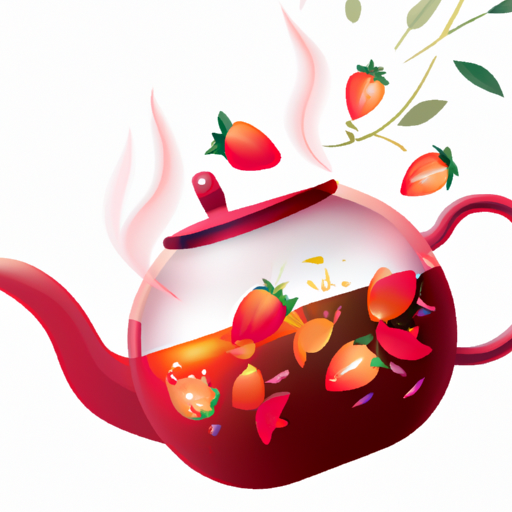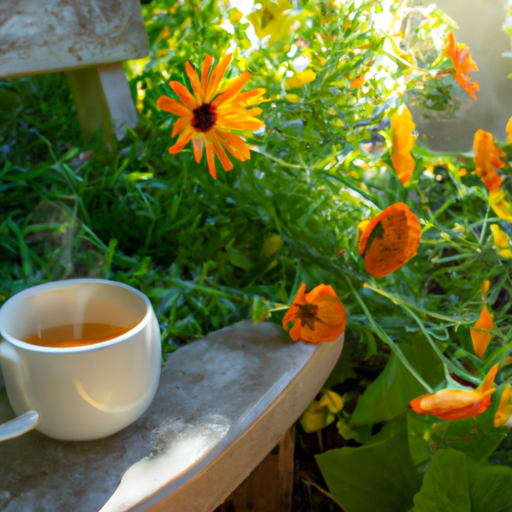Picture yourself enjoying a peaceful afternoon, sipping on a warm cup of herbal tea. It’s a comforting and soothing experience, reminiscent of a gentle breeze on a sunny day. But did you know that certain herbal teas can interfere with your blood pressure medication?
It’s like a delicate dance between your health and the potential risks associated with herbal remedies. In this article, we will explore the kinds of herbal teas that can mess with your blood pressure medication, and why it’s crucial to consult with your healthcare provider before incorporating them into your routine.
We will also discuss alternative herbal teas that may be safer options, as well as lifestyle changes that can support healthy blood pressure management.
So, grab your favorite mug, and let’s dive into the world of herbal teas and their impact on blood pressure medication.
Key Takeaways
- Licorice root tea can cause sodium and water retention, leading to elevated blood pressure.
- Hibiscus tea may interact with blood pressure medication due to its mild diuretic effect.
- Green tea contains caffeine and can increase blood pressure.
- Ginseng tea has been associated with increased blood pressure.
Types of Herbal Teas to Avoid
If you’re taking blood pressure medication, it’s important to steer clear of certain herbal teas that can wreak havoc on your health.
While herbal teas are generally considered safe and beneficial, there are a few types that can interfere with your medication and potentially increase your blood pressure.
One of the most common culprits is licorice root tea, which contains a compound called glycyrrhizin that can cause sodium and water retention, leading to elevated blood pressure.
Another tea to avoid is hibiscus tea, which has been found to have a mild diuretic effect and may interact with certain blood pressure medications.
It’s also important to be cautious with green tea, as it contains caffeine and can increase blood pressure in some individuals.
To ensure your safety, it’s best to consult with your healthcare provider before incorporating any new herbal tea options into your routine.
Transitioning into the next section, let’s explore the potential interactions with blood pressure medication.
Potential Interactions with Blood Pressure Medication
When it comes to potential interactions with blood pressure medication, there are two key points to consider: increased blood pressure and reduced effectiveness of the medication.
It’s important to be aware that certain herbal teas can actually raise your blood pressure, which can be counterproductive if you’re trying to manage hypertension.
Additionally, some herbal teas have been found to interfere with the absorption and effectiveness of blood pressure medication, making it important to exercise caution when combining these two.
Increased Blood Pressure
Although herbal teas can offer various health benefits, it’s important to note that some herbal teas, such as licorice tea, can potentially interfere with blood pressure medication, leading to increased blood pressure levels, affecting approximately 30% of individuals who consume it regularly.
When it comes to managing high blood pressure, it is crucial to be aware of potential side effects that can arise from the interaction between herbal teas and blood pressure medication. Here are four key points to consider:
-
Licorice tea contains glycyrrhizin, which can cause sodium and water retention, leading to elevated blood pressure levels.
-
Hibiscus tea has been found to have a mild blood pressure-lowering effect, but it may interact with certain blood pressure medications, causing an additive effect.
-
Green tea, rich in antioxidants, has shown promising effects in reducing blood pressure; however, it may interfere with the absorption of certain blood pressure medications.
-
Ginseng tea has been associated with increased blood pressure, especially when consumed in large amounts.
Understanding the potential interactions between herbal teas and blood pressure medication is essential to ensure the effectiveness of treatment. Moving forward, we will explore the topic of reduced effectiveness of medication.
Reduced Effectiveness of Medication
One thing to keep in mind is that certain factors can diminish how well your medication works. When it comes to blood pressure medication, there is a potential for reduced effectiveness when certain herbal teas are consumed. It is important to be aware of the potential side effects and herbal tea precautions to ensure that your medication is not compromised. Below is a table outlining some herbal teas that may interfere with blood pressure medication:
| Herbal Tea | Potential Side Effects | Precautions |
|---|---|---|
| Licorice Root | Increased blood pressure | Avoid if you have high blood pressure or take medication |
| Hawthorn Berry | Reduced blood pressure | Consult with your healthcare provider before consuming |
| Ginseng | Increased blood pressure | Avoid if you have high blood pressure or take medication |
It is crucial to consult with your healthcare provider before incorporating any herbal teas into your routine. This will ensure that you are taking the necessary precautions and not compromising the effectiveness of your medication.
Importance of Consulting with Your Healthcare Provider
When it comes to consuming herbal tea while taking blood pressure medication, it’s important to consult with your healthcare provider. They can provide guidance on which types of herbal tea may interact with your medication and advise on safe consumption.
Additionally, adjusting medication dosages should only be done under the supervision of a healthcare professional to ensure optimal effectiveness and safety.
Discussing Herbal Tea Consumption
Additionally, consuming certain herbal teas may interfere with the effectiveness of blood pressure medication. While herbal teas have been praised for their numerous health benefits, it’s important to be aware of their potential side effects when combined with medication.
Some herbal teas, such as hibiscus and green tea, have been found to have blood pressure-lowering effects. While this may seem beneficial for individuals with high blood pressure, it can be problematic when taken alongside blood pressure medication. The combination of the two can cause blood pressure to drop too low, leading to dizziness and fainting.
Therefore, it’s crucial to consult with your healthcare provider before incorporating herbal teas into your routine, especially if you’re taking blood pressure medication. This will ensure that your medication dosage can be adjusted accordingly to avoid any potential complications.
Adjusting Medication Dosages
Adjusting medication dosages can be like fine-tuning a musical instrument, ensuring the perfect balance for optimal health.
When it comes to blood pressure medication, it’s important to be mindful of potential interactions with herbal teas. Adjusting your medication regimen might be necessary if you regularly consume certain herbal teas.
Here are some potential side effects to be aware of:
-
Chamomile tea: Can lower blood pressure, so it may enhance the effects of blood pressure medication.
-
Ginseng tea: Can increase blood pressure, which can counteract the effects of blood pressure medication.
-
Hawthorn tea: May have additive effects with blood pressure medication, potentially lowering blood pressure too much.
-
Licorice tea: Can cause sodium and water retention, which may raise blood pressure and counteract the effects of medication.
-
Hibiscus tea: May have a mild blood pressure-lowering effect, so it’s important to monitor blood pressure closely.
Considering these potential interactions, it’s crucial to discuss your herbal tea consumption with your healthcare provider to ensure the optimal adjustment of your medication regimen.
Alternative Herbal Teas to Consider
While we’re on the topic of alternative herbal teas, let’s explore some options that won’t mess with your blood pressure medication. When it comes to alternative herbal remedies, it’s important to consider potential side effects.
Certain herbal teas can interact with blood pressure medication, so it’s crucial to choose ones that are safe. Chamomile tea is a popular choice that hasn’t been shown to have any adverse effects on blood pressure medication. Its calming properties can even help reduce stress, which is beneficial for maintaining healthy blood pressure levels.
Another option is hibiscus tea, which has been found to have a positive impact on blood pressure. It contains compounds that can help relax blood vessels, leading to lower blood pressure.
So, while enjoying these herbal teas, it’s still important to monitor your blood pressure closely to ensure your medication is working effectively.
Monitoring Your Blood Pressure
Regular check-ups and monitoring changes in blood pressure are crucial for managing hypertension effectively. By scheduling regular check-ups with a healthcare professional, I can ensure that my blood pressure is being monitored and any necessary adjustments to my medication can be made.
Tracking changes in blood pressure allows me to identify any patterns or triggers that may be affecting my blood pressure levels and take appropriate action to maintain optimal cardiovascular health.
Regular Check-ups
Make sure you schedule regular check-ups to monitor how herbal teas may interact with your blood pressure medication. It’s important to stay on top of any potential changes in your blood pressure and make necessary lifestyle modifications.
During these check-ups, your healthcare provider can assess your blood pressure readings and evaluate any potential interactions or side effects of herbal teas on your medication. They may also recommend adjustments to your medication or suggest alternative herbal teas that are safe to consume with your current medication.
Tracking changes in your blood pressure is crucial in maintaining your overall health and managing any potential risks. It allows you and your healthcare provider to make informed decisions about your treatment plan and ensure that your blood pressure remains stable.
Tracking Changes in Blood Pressure
Keep an eye on any fluctuations in your blood pressure levels to effectively manage your overall health and make informed decisions about your treatment plan.
Tracking progress is essential in understanding how your blood pressure responds to different lifestyle modifications and medications. By regularly monitoring your blood pressure, you can identify patterns and determine if your current treatment plan is working effectively.
Additionally, tracking changes in your blood pressure can help you and your healthcare provider make informed decisions about adjusting medication dosages or considering alternative treatment options.
Lifestyle modifications, such as exercise, healthy eating, and stress management, can also play a significant role in managing blood pressure. By incorporating these changes into your daily routine, you can support your blood pressure management and potentially reduce the need for medication.
Transitioning into the subsequent section about lifestyle changes to support blood pressure management, it’s important to explore additional strategies beyond medication.
Lifestyle Changes to Support Blood Pressure Management
To better support blood pressure management, it’s important to adopt lifestyle changes that can positively impact your overall health. Making certain lifestyle modifications can significantly contribute to the management of blood pressure. Here are some key changes to consider:
-
Engage in regular physical activity: Regular exercise, such as brisk walking or swimming, can help lower blood pressure.
-
Follow a healthy diet: Incorporate foods rich in fruits, vegetables, whole grains, and lean proteins while reducing sodium, saturated fats, and added sugars.
-
Limit alcohol consumption: Excessive alcohol intake can raise blood pressure, so it’s best to moderate your alcohol consumption.
-
Manage stress levels: Find stress-relieving techniques like meditation or deep breathing exercises to help lower blood pressure.
-
Quit smoking: Smoking can increase blood pressure and damage blood vessels, so quitting is crucial.
By implementing these lifestyle changes, you can improve your overall health and support blood pressure management.
Moving forward, let’s delve into the conclusion and final thoughts.
Conclusion and Final Thoughts
In conclusion, it’s essential for you to understand that incorporating these lifestyle changes can have a significant impact on managing your blood pressure and improving your overall health. By making these changes, you’re taking proactive steps towards controlling your blood pressure and reducing the risk of complications.
However, it’s crucial to consult with your healthcare provider before making any significant changes, including starting herbal tea consumption. Not consulting your healthcare provider can have serious consequences, as certain herbal teas can interact with blood pressure medications. This can lead to adverse effects and potentially interfere with the effectiveness of your medication.
Additionally, making these lifestyle changes can have a positive impact on your overall health. By maintaining a healthy weight, eating a balanced diet, exercising regularly, and managing stress, you can improve your cardiovascular health and reduce the risk of other chronic conditions.
Frequently Asked Questions
Can I still consume herbal teas if I am not taking any blood pressure medication?
I can still consume herbal teas without any dietary restrictions, as long as I am not taking any blood pressure medication. There are no potential side effects in this case.
Are there any herbal teas that can actually help lower blood pressure?
One interesting statistic is that drinking hibiscus tea can lower systolic blood pressure by an average of 7.58 mmHg. Other herbal teas that may have blood pressure-lowering benefits include green tea and hawthorn tea.
Can herbal teas interact with other medications besides blood pressure medication?
Herbal tea interactions with medications can pose potential risks. It’s important to be aware that herbal teas can interact with various medications, not just blood pressure medication. Consulting with a healthcare professional is advised.
How frequently should I monitor my blood pressure if I am a regular consumer of herbal teas?
I should monitor my blood pressure regularly if I consume herbal teas regularly. Long-term consumption of herbal teas may have potential risks on blood pressure. It is important to stay aware of any changes.
Are there any specific lifestyle changes that can help manage blood pressure even if I continue consuming herbal teas?
Making lifestyle changes, such as reducing sodium intake and exercising regularly, can help manage blood pressure even if I continue consuming herbal teas. Exploring herbal tea alternatives may also be beneficial.
Conclusion
As I conclude this article, I’m reminded of the importance of being cautious when it comes to herbal teas and blood pressure medication.
The potential interactions between certain herbal teas and blood pressure medication can have serious consequences. It’s imperative to consult with your healthcare provider to ensure the safety and effectiveness of your treatment plan.
While there are alternative herbal teas to consider, monitoring your blood pressure and making necessary lifestyle changes are essential.
Remember, knowledge is power when it comes to managing your blood pressure effectively. Stay informed, stay healthy.










